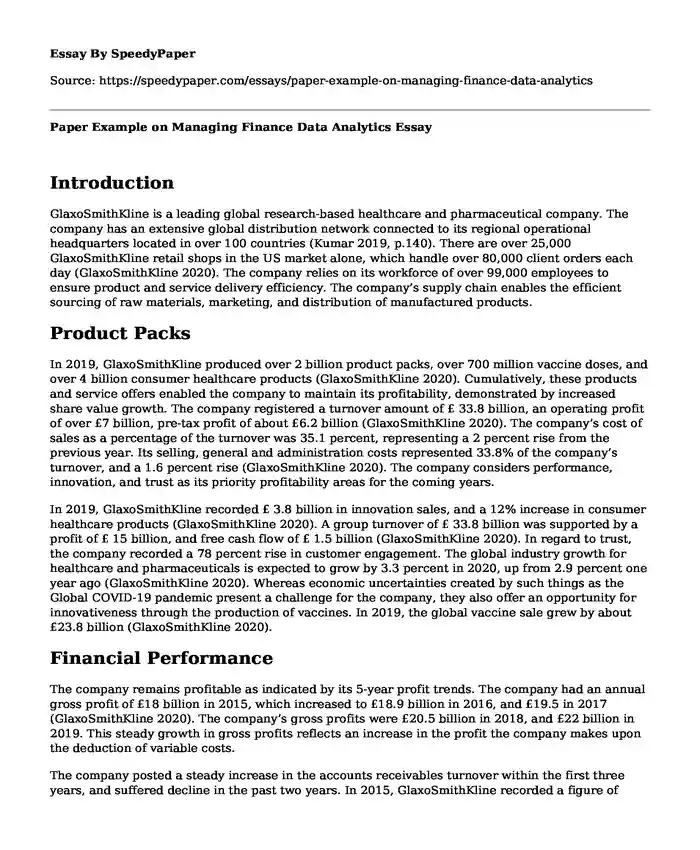
| Type of paper: | Essay |
| Categories: | Company Business Financial analysis |
| Pages: | 2 |
| Wordcount: | 539 words |
Introduction
GlaxoSmithKline is a leading global research-based healthcare and pharmaceutical company. The company has an extensive global distribution network connected to its regional operational headquarters located in over 100 countries (Kumar 2019, p.140). There are over 25,000 GlaxoSmithKline retail shops in the US market alone, which handle over 80,000 client orders each day (GlaxoSmithKline 2020). The company relies on its workforce of over 99,000 employees to ensure product and service delivery efficiency. The company’s supply chain enables the efficient sourcing of raw materials, marketing, and distribution of manufactured products.
Product Packs
In 2019, GlaxoSmithKline produced over 2 billion product packs, over 700 million vaccine doses, and over 4 billion consumer healthcare products (GlaxoSmithKline 2020). Cumulatively, these products and service offers enabled the company to maintain its profitability, demonstrated by increased share value growth. The company registered a turnover amount of £ 33.8 billion, an operating profit of over £7 billion, pre-tax profit of about £6.2 billion (GlaxoSmithKline 2020). The company’s cost of sales as a percentage of the turnover was 35.1 percent, representing a 2 percent rise from the previous year. Its selling, general and administration costs represented 33.8% of the company’s turnover, and a 1.6 percent rise (GlaxoSmithKline 2020). The company considers performance, innovation, and trust as its priority profitability areas for the coming years.
In 2019, GlaxoSmithKline recorded £ 3.8 billion in innovation sales, and a 12% increase in consumer healthcare products (GlaxoSmithKline 2020). A group turnover of £ 33.8 billion was supported by a profit of £ 15 billion, and free cash flow of £ 1.5 billion (GlaxoSmithKline 2020). In regard to trust, the company recorded a 78 percent rise in customer engagement. The global industry growth for healthcare and pharmaceuticals is expected to grow by 3.3 percent in 2020, up from 2.9 percent one year ago (GlaxoSmithKline 2020). Whereas economic uncertainties created by such things as the Global COVID-19 pandemic present a challenge for the company, they also offer an opportunity for innovativeness through the production of vaccines. In 2019, the global vaccine sale grew by about £23.8 billion (GlaxoSmithKline 2020).
Financial Performance
The company remains profitable as indicated by its 5-year profit trends. The company had an annual gross profit of £18 billion in 2015, which increased to £18.9 billion in 2016, and £19.5 in 2017 (GlaxoSmithKline 2020). The company’s gross profits were £20.5 billion in 2018, and £22 billion in 2019. This steady growth in gross profits reflects an increase in the profit the company makes upon the deduction of variable costs.
The company posted a steady increase in the accounts receivables turnover within the first three years, and suffered decline in the past two years. In 2015, GlaxoSmithKline recorded a figure of 4.36, and a value of 4.71 in 2016 (GlaxoSmithKline 2020). 2017 marked the highest value at 5.07, before a drop to 4.88 in 2018 and 4.72 in 2019 (GlaxoSmithKline 2020).
Conclusion
There are over 60 GlaxoSmithKline brands that reach over 4 billion consumers each year (GlaxoSmithKline 2020). The company relies on four regional distribution centers (RDCs) and has made significant investments in research and development. In 2019, the company’s R&D received £4.6 billion (GlaxoSmithKline 2020). The company’s financial statements demonstrate a steady growth in sales, which is supported by continuous release of new products.
References
Kumar, B.R., 2019. GlaxoSmithKline Merger. In Wealth Creation in the World’s Largest Mergers and Acquisitions (pp. 137-145). Springer, Cham.
GlaxoSmithKline, 2020. Annual Report, 2019. Available at:
https://www.gsk.com/media/5894/annual-report.pdf.
Cite this page
Paper Example on Managing Finance Data Analytics. (2024, Jan 11). Retrieved from https://speedypaper.net/essays/paper-example-on-managing-finance-data-analytics
Request Removal
If you are the original author of this essay and no longer wish to have it published on the SpeedyPaper website, please click below to request its removal:
- Essay Example on Balancing Local Standardized Products Globally
- Reflective Essay: Problem Solving, Free Example for You
- Free Essay: Degrees of Freedom. Assumptions for Conducting a Paired or Dependent Samples T-Test
- Free Essay: The State of Hockey in Canada
- Free Essay Sample - Food Memoir
- Paper Example. Enhancing Nursing Teamwork: A Quality Improvement Initiative
- Free Paper Example on Cost-Reduction Methods at Amazon
Popular categories




